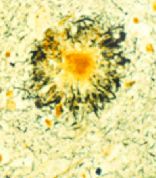
Based on what is available, here’s what we know.
- Massage and touch are alternatives or complements to other therapies.
- There’s improvement in the management of behavioral, emotional, and perhaps other conditions associated with dementia.
- There are no severe side effects.
These conclusions are based on the results from hand massage used for the immediate or short-term reduction of agitation, and the addition of touch to verbal encouragement to eat meals.
As one whose mother is in a nursing home with Alzheimer’s, the relaxation and benefits she feels from just gently rubbing her back or hands are obvious.
Massage and touch therapy have immediate benefits. At this stage of life they meet the primary objective to improve quality-of-life and a feeling of well-being.
11/2/06 10:21 JR